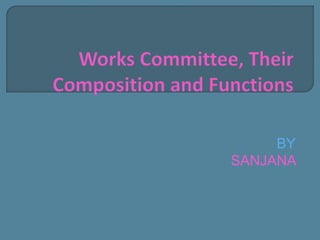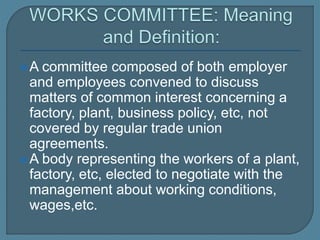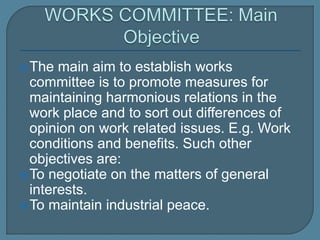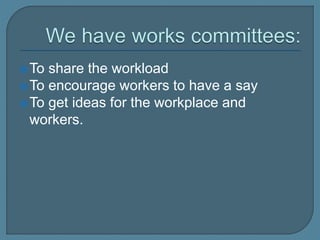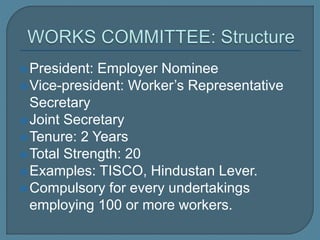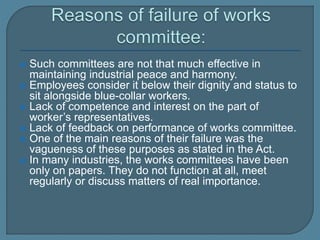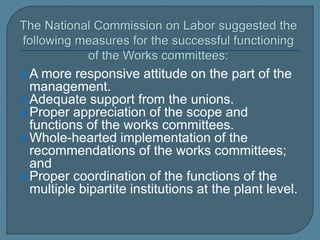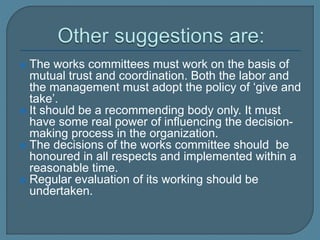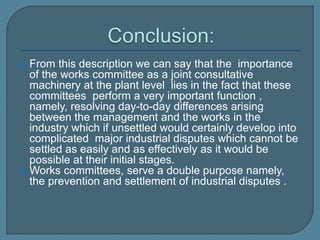Works committees
- 1. BY SANJANA
- 2. ïķA committee composed of both employer and employees convened to discuss matters of common interest concerning a factory, plant, business policy, etc, not covered by regular trade union agreements. ïķA body representing the workers of a plant, factory, etc, elected to negotiate with the management about working conditions, wages,etc.
- 3. ïķThe works committee- set up under the INDUSTRIAL DISPUTE ACT,1947. ïķUnder this Act, every establishment employing 100 or more workers is required to constitute a works committee as a scheme of workers participation in management. ïķIt consists of equal number of representatives from the employer and the employees.
- 4. ïķThe main aim to establish works committee is to promote measures for maintaining harmonious relations in the work place and to sort out differences of opinion on work related issues. E.g. Work conditions and benefits. Such other objectives are: ïķTo negotiate on the matters of general interests. ïķTo maintain industrial peace.
- 5. ïTo share the workload ïTo encourage workers to have a say ïTo get ideas for the workplace and workers.
- 6. ïķPresident: Employer Nominee ïķVice-president: Workerâs Representative Secretary ïķJoint Secretary ïķTenure: 2 Years ïķTotal Strength: 20 ïķExamples: TISCO, Hindustan Lever. ïķCompulsory for every undertakings employing 100 or more workers.
- 7. ïķ Works committee deals with matters of day-to-day functioning at the shop floor level. Works committees are concerned with: a. Health: Ventilation, Lighting, Temperature and Sanitation facilities. b. Safety: Accident Prevention, Occupational diseases and Protective equipments. c. Welfare: Rest rooms, medical and health services, drinking water. d. Administration of welfare and fine funds. e. Educational and recreational activities. E.g. Health, Safety and Welfare committee. Such committees were made in TATA Iron & Steel Works, Jamshedpur, Carnatik Mill in Madras in 1922. f. Adjustments of festivals and national holidays. g. Promotion of thrift and savings. h. To see that the decisions taken in the works committee are fully enforced.
- 8. ï Such committees are not that much effective in maintaining industrial peace and harmony. ï Employees consider it below their dignity and status to sit alongside blue-collar workers. ï Lack of competence and interest on the part of workerâs representatives. ï Lack of feedback on performance of works committee. ï One of the main reasons of their failure was the vagueness of these purposes as stated in the Act. ï In many industries, the works committees have been only on papers. They do not function at all, meet regularly or discuss matters of real importance.
- 9. ï A more responsive attitude on the part of the management. ï Adequate support from the unions. ï Proper appreciation of the scope and functions of the works committees. ï Whole-hearted implementation of the recommendations of the works committees; and ï Proper coordination of the functions of the multiple bipartite institutions at the plant level.
- 10. ï The works committees must work on the basis of mutual trust and coordination. Both the labor and the management must adopt the policy of âgive and takeâ. ï It should be a recommending body only. It must have some real power of influencing the decision- making process in the organization. ï The decisions of the works committee should be honoured in all respects and implemented within a reasonable time. ï Regular evaluation of its working should be undertaken.
- 11. ï From this description we can say that the importance of the works committee as a joint consultative machinery at the plant level lies in the fact that these committees perform a very important function , namely, resolving day-to-day differences arising between the management and the works in the industry which if unsettled would certainly develop into complicated major industrial disputes which cannot be settled as easily and as effectively as it would be possible at their initial stages. ï Works committees, serve a double purpose namely, the prevention and settlement of industrial disputes .
- 12. ï Sangal, J(first ed. 2010),Industrial Sociology,Shubham Publication,Dilshad Garden,New Delhi-110095. ï http://www.slideshare.net/mobile/parags06/wo rkers-participation-in-management-32025080 ï http://www.answers.com/Q/What_are_the_fun ctions-of_works_committee/ ï http://industrialdisputesact1947.blogspot.com/ 2011/04/part-vii-works-committee.html ï http://www.thefreedictionary.com/works+com mittees

